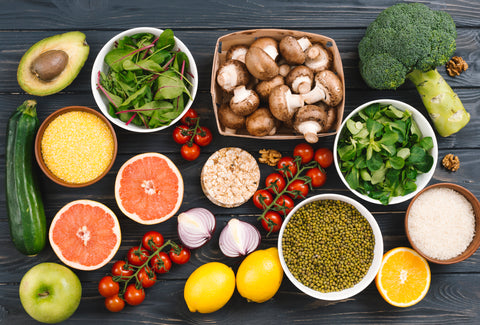
10 Vegetarian Foods to Boost Collagen Production
, by SEO DIGITAL, 6 min reading time
Stay tuned, Your Favourite supplements will be back in stock soon!
Stay tuned, Your Favourite supplements will be back in stock soon!
Stay tuned, Your Favourite supplements will be back in stock soon!
Stay tuned, Your Favourite supplements will be back in stock soon!
Stay tuned, Your Favourite supplements will be back in stock soon!
Stay tuned, Your Favourite supplements will be back in stock soon!
Stay tuned, Your Favourite supplements will be back in stock soon!
Stay tuned, Your Favourite supplements will be back in stock soon!
Stay tuned, Your Favourite supplements will be back in stock soon!
Stay tuned, Your Favourite supplements will be back in stock soon!

, by SEO DIGITAL, 6 min reading time

Collagen is a protein that plays a fundamental role in maintaining the health and elasticity of our skin, joints, and connective tissues. While collagen is commonly associated with animal-derived sources, vegetarian alternatives rich in nutrients that support collagen production also exist.
Buy One Get One Free: Vegan Protein Isolate | Plant Based Isolate Protein Powder
Soy Products
Soy-based products like tofu and tempeh are excellent sources of genistein, a compound that stimulates collagen production and inhibits enzymes that break down collagen. Incorporate these versatile plant-based proteins into your diet through stir-fries, salads, or marinated and grilled dishes to support collagen synthesis.
Citrus fruits are renowned for their high vitamin C content, a crucial nutrient for collagen synthesis. Vitamin C is involved in the formation of collagen molecules and acts as an antioxidant, protecting existing collagen from damage. Enjoy a daily dose of citrus fruits in salads, smoothies, or as refreshing snacks to promote skin elasticity and overall collagen health.
Berries are not only delicious but also packed with antioxidants and vitamin C. These antioxidants neutralize free radicals that can damage collagen and contribute to premature ageing. Including a variety of berries in your diet provides a spectrum of nutrients that support collagen production while adding a burst of flavour to your meals or snacks.
Dark leafy greens are rich in vitamins and minerals essential for collagen synthesis, including vitamin A, vitamin C, and chlorophyll. These nutrients play a key role in maintaining skin health and promoting collagen production. Add spinach, kale, or Swiss chard to your salads, smoothies, or sautéed dishes for a collagen-boosting nutritional punch.
Nuts and seeds are excellent sources of essential fatty acids, which contribute to skin health and collagen synthesis. Additionally, they contain zinc, a mineral that supports collagen production and helps maintain the integrity of connective tissues. Snack on a handful of almonds, and walnuts, or incorporate flaxseeds into your breakfast to enhance your collagen-boosting efforts.
Avocado is not only a delicious addition to various dishes but also a natural source of healthy fats, vitamin E, and vitamin C. Vitamin E acts as an antioxidant, protecting collagen from oxidative stress, while vitamin C supports collagen synthesis. Spread avocado on toast, add it to salads, or blend it into smoothies for a creamy and collagen-boosting treat.
Colourful bell peppers are rich in vitamin C, an essential nutrient for collagen formation. They also contain carotenoids, antioxidants that contribute to skin health and protect collagen from degradation. Include bell peppers in salads, stir-fries, or as a crunchy snack to add vibrancy and collagen-boosting properties to your meals.
Tomatoes are a great source of lycopene, an antioxidant that protects collagen from UV damage and promotes skin health. Whether enjoyed fresh in salads, cooked in sauces, or blended into soups, tomatoes provide a tasty and collagen-protective addition to your vegetarian diet.
Legumes are rich in proline, an amino acid essential for collagen synthesis. Additionally, they contain ample amounts of protein, which supports overall tissue repair and regeneration. Incorporate a variety of legumes into your meals, such as bean salads, lentil stews, or chickpea curries, to provide your body with the building blocks it needs for collagen production.
Pumpkin seeds, also known as pepitas, are a fantastic source of zinc, a mineral crucial for collagen integrity and wound healing. Zinc supports the production of collagen fibers and helps maintain the strength of connective tissues. Snack on roasted pumpkin seeds or sprinkle them on salads and yogurt to boost your zinc intake and support collagen health.
Maintaining healthy collagen levels is essential for overall well-being, and as a vegetarian, you can achieve this through a thoughtful selection of plant-based foods. By incorporating soy products, citrus fruits, berries, leafy greens, nuts, seeds, avocado, bell peppers, tomatoes, legumes, and pumpkin seeds into your diet, you can naturally boost collagen production and support the health of your skin, joints, and connective tissues. Remember that a well-balanced, varied diet, combined with a healthy lifestyle, contributes not only to collagen synthesis but also to your overall vitality and longevity.